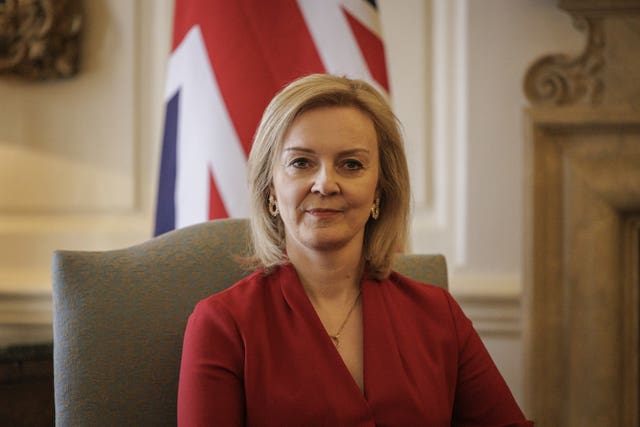
Nato is “deadly serious” about its response to Russia’s military build-up on the borders of Ukraine, Defence Secretary Ben Wallace has said.
He echoed the US assessment that Russian President Vladimir Putin has sent a further 7,000 troops to border regions despite claims in Moscow that forces are being withdrawn.
Mr Wallace said Russia would be judged by its actions and “at the moment the troop build-up continues”.
The Defence Secretary’s comments came as he gathered with Nato counterparts in Brussels to consider the alliance’s response to the crisis.
“I think we have seen the opposite of some of the (Russian) statements, we’ve seen an increase of troops over the last 48 hours, up to 7,000,” he said.
Mr Wallace said Mr Putin risked making a “strategic error” if he invades Ukraine, because it would result in a stronger Nato presence in eastern Europe.
Russia has denied having plans to invade and released footage in recent days claiming to show troops and equipment moving back to base following military exercises in regions close to the Ukraine border.
But Mr Wallace said nearly 60% of Russia’s land combat forces were in place around the borders of Ukraine.

Although an invasion is unlikely to result in British troops fighting, as Ukraine is not a Nato member, the military build-up has caused anxiety among eastern members of the alliance.
UK forces have been committed to efforts to bolster defences on Nato’s eastern flank.
Britain has already said it is doubling its number of troops in Estonia, with around 850 members of the Royal Welsh battlegroup heading from Sennelager in Germany and bases in Europe for the Baltic state, while 350 Royal Marines are being despatched to Poland.
Four additional RAF Typhoon jets have landed in Cyprus to join Nato patrols over eastern Europe, while offshore patrol vessel HMS Trent will shortly be joined in the eastern Mediterranean by HMS Diamond, a Type 45 destroyer.
🇬🇧 Defence Secretary Ben Wallace is attending Day 2 of NATO #DefMins.
Across meetings with Allies and close partners Georgia 🇬🇪 Ukraine 🇺🇦 Finland 🇫🇮 Sweden 🇸🇪 and the EU 🇪🇺 he will discuss security challenges in the Euro-Atlantic area. pic.twitter.com/PJEWQw0Vbf
— UK Delegation to NATO (@UKNATO) February 17, 2022
The Defence Secretary said it is important that Mr Putin understands that Nato is united and “deadly serious in how we are going to face the threat that is currently being posed to both Ukraine and potentially to our security”.
Nato secretary general Jens Stoltenberg said: “There are signs from Moscow that diplomacy could continue but so far we have not seen any sign of withdrawal or de-escalation.
“Russia has yet again demonstrated a disregard for the principles underpinning European security and its ability and willingness to threaten the use of force in pursuit of its objectives.”
Mr Stoltenberg said the actions of Russia could be the “new normal” for relations in Europe.
The prospect of a new Cold War was acknowledged by the UK’s armed forces minister James Heappey, who told LBC a period of “acute competition” between Russia and the West “could last a generation or more”.
Foreign Secretary Liz Truss was visiting eastern Europe and giving a speech in Ukraine’s capital Kyiv in a show of support.
“We must not be lulled into a false sense of security by Russia claiming that some troops are returning to their barracks, while in fact the Russian military build-up shows no signs of slowing,” she wrote in the Daily Telegraph.
“We must have no illusions that Russia could drag this out much longer in a brazen ploy to spend weeks more – if not months – subverting Ukraine and challenging western unity. This is a test of our mettle.”
She will use the Kyiv speech to say the “path of diplomacy” remains open if Moscow really wants a peaceful resolution.

“But we are very clear – if they decide to continue down the path of aggression, there will be massive consequences, bringing Russia severe economic costs and pariah status,” she will say.
Moscow has repeatedly denied having any intention of attacking Ukraine, despite massing an estimated 130,000 troops along the border, and it has mocked reports in the West which suggested an invasion could have been launched on Wednesday.
Russia’s deputy ambassador to the United Nations, Dmitry Polyanskiy, dismissed the claims as “fantasies” by western politicians.
“This is a very ridiculous situation, there has been hysteria, even hype, fanned for several weeks by our western colleagues,” he told ITV’s Peston programme.
“They convinced each other and the whole world that Russia was about to invade, they were even naming concrete dates. So it happened in their minds, in their heads.”


Comments: Our rules
We want our comments to be a lively and valuable part of our community - a place where readers can debate and engage with the most important local issues. The ability to comment on our stories is a privilege, not a right, however, and that privilege may be withdrawn if it is abused or misused.
Please report any comments that break our rules.
Read the rules here